
England wasted the brilliance of Terry Venables and were left to wonder what might have been
Terry Venables was the lost great England manager and, until Gareth Southgate, the last great England manager. The link between Alf Ramsey, for whom he briefly played, and Southgate, who he plucked from Aston Villa and turned into an assured international with seeming ease, Venables may have fashioned the best England team since 1966. And if that verdict comes from the slender evidence of perhaps two-and-a-half games of playing well on home soil – the second 45 minutes against Scotland, the rout of the Netherlands, the semi-final against Germany – Euro 96 will forever leave a generation with a sense of what might have been. From the wreckage of the doomed campaign to qualify for the 1994 World Cup, Venables seemed to inspire an English enlightenment. From the plodding dullness of long-ball football purveyed by limited players, he allied technical and tactical excellence with attacking intent and a willingness to embrace all the talents at his disposal. It may have been the only time in the last half-century when England were the finest team in a tournament; it is not jingoism to think that, had Germany been worse at penalties, Venables’ team would have beaten Czech Republic in the final. It ought to have been the start of an era; instead, it was an interlude. On Sunday, Venables died aged 80 after a long illness. He managed England for two-and-a-half of those years and it should have been more. If the FA’s reluctance to extend his deal before Euro 96 reflected a sense of disquiet about his business dealings – Venables ended up being banned from being a company director for seven years – it was a mistake. No one else took England to a semi-final for more than two decades; even when Southgate did, no one else brought such adept man-management and tactical nous. If Venables was England’s most charismatic manager, a throwback in that respect to Tommy Docherty, under whom he emerged at Chelsea, and Malcolm Allison, who gave him his first coaching job at Crystal Palace, he was years ahead of his time in other respects. Gary Neville recalled ostensibly playing right-back in three consecutive games at Euro 96, but actually occupying different positions in each. In an age of a lumpen 4-4-2, Venables could switch systems, adopt the Christmas tree or the back three, school the Dutch in Total Football. The managers England later imported at great expense, Sven-Goran Eriksson and Fabio Capello, produced less sophisticated football than the boy from Dagenham. The tributes reflected his rare gifts. “The best, most innovative coach that I had the privilege and pleasure of playing for,” said Gary Lineker, who also played for Johan Cruyff. “The most technically gifted coach that I ever played under,” said Neville, who played 602 times for Sir Alex Ferguson. And yet the tragedy of Venables, for him as well as England, was that his eventual achievements placed him in the category of the very good and not the great. Perhaps only penalties kept him out of the pantheon: Southgate’s tame spot-kick in 1996, the four that – ludicrously – Barcelona contrived to miss while scoring none in the 1986 European Cup final shootout. And if there is an Anglocentric focus on the national team, it is worth noting that in the last seven decades, only one English manager has won either the French, German, Italian or Spanish league title: Venables, in his first season at Barcelona, when they had not been champions for a decade, when Diego Maradona had been sold and the man hired from QPR replaced him with Steve Archibald. They won La Liga by 10 points, topping the table from start to finish. He was a game away from a second stunning achievement, winning Barcelona’s maiden European Cup. Steaua Bucharest defended for 120 minutes in the final before what Venables subsequently described as “the worst penalty shootout you’ve ever seen”. Yet there is a picture after the semi-final of a teenager on Barcelona’s books gazing up adoringly at Venables. If a young Pep Guardiola was influenced by Venables, he was not alone. Yet a managerial career can be divided into two halves: before and after Euro 96. He enjoyed success everywhere in the first part of his coaching career, taking Palace to promotion and, briefly, top of the old Division 1, QPR to a fifth-place finish, Tottenham to third and the FA Cup, which he had also won as a Spurs player. But football sometimes seemed insufficient for a man of his ideas, energy and entrepreneurial spirit. Venables was author, crooner, nightclub owner. He had a sharp intellect, a belief in his own ability, but also a willingness to aim for the boardroom when he was at his best on the training pitch and in the dugout. In a way, Venables’ other interests made him suited to international management; the nature of them made the FA uncomfortable. And he left the job that suited him best. He went on to take Australia to the brink of the World Cup, denied only by away goals, and rescue Middlesbrough from relegation, but spells back at Palace, at Leeds and as assistant to Steve McClaren at England represented an underwhelming end to a coaching career that took him to the brink of history. There was, though, a fitting element to finishing with England. Venables played for his country at every level, from schoolboy to youth, amateur, under-23 and the full senior team. He was capped just twice by Ramsey; perhaps it did not help that sons of Dagenham were very different – Ramsey the social climber who took elocution lessons, Venables the brash, wisecracking showman. He was not to be a World Cup winner; he made the provisional 33-man squad for the 1966 tournament, but not the final 22. But the glimpse of glory as a manager was tantalising. Venables brought hope to English football, boosting its self-esteem, forging indelible memories, whether of Paul Gascoigne’s goal against Scotland or the 4-1 evisceration of the Netherlands. He left England – the players and the fans, anyway – wanting more. Nostalgia for Euro 96 is already a cottage industry and, as no Englishman has emerged with his managerial skillset since, there will be reasons to remember Terry Venables fondly for years to come. Read More The sporting weekend in pictures Former England boss Terry Venables remembered as an innovator and inspiration Terry Venables gives important advice to Southgate after Euro 96 in resurfaced clip Gareth Southgate pays tribute to ‘outstanding coach’ Terry Venables How Terry Venables brought football home in England’s greatest summer since 1966 England’s Euro 96 stars including Gary Lineker pay tribute to Terry Venables
1970-01-01 08:00

Three students of Palestinian descent shot in Vermont, CNN says suspect held
By Gabriella Borter and Steve Gorman (Reuters) -A suspect was arrested in the shooting of three college students of Palestinian
1970-01-01 08:00
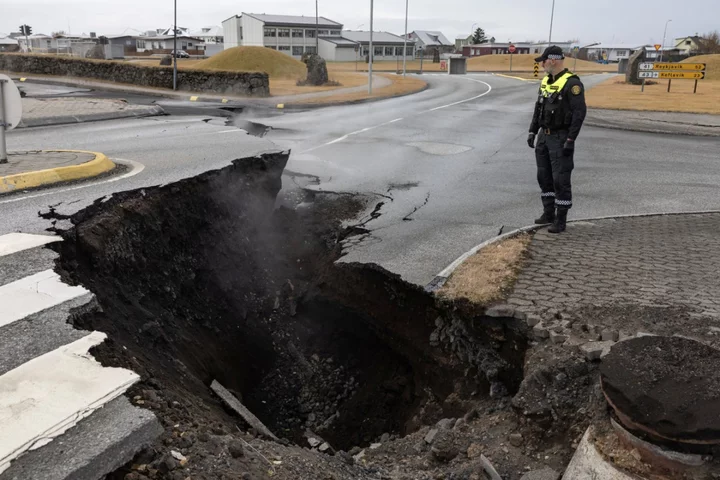
Iceland volcano – live: Met Office records strongest earthquake in 48 hours as fears over eruption remains
The strongest earthquake in 48 hours was detected near the evacuated town of Grindavik this morning, as the Icelandic Met Office continues to warn of the “persistent likelihood of an imminent eruption”. In its latest update, the forecaster said there were around 300 earthquakes on Sunday, with a “swarm” near the town which lasted just over an hour before midnight. They included a earthquake with a magnitude of 3, located three miles north easts of Grindavik, at 00.26am on Monday. Over the previous 48 hours, the strongest earthquake had a 2.7 magnitude. A fortnight ago, Grindavik was evacuated after magma-induced seismic activity tore vast chasms through the streets of the town. While hundreds of earthquakes are still hitting the surrounding area daily, “seismic activity continues to decrease”, said the Icelandic Met Office, adding: “The likelihood of an imminent volcanic eruption diminishes with time.” However, one civil protection official told theThe Independent “It is still dangerous here ... I have never seen anything like it before. Usually we will have a few minutes warning to get out, but with the weather like it is today, we have even less.” Read More What to do with Grindavík: Has Iceland’s #1 selfie spot just emerged out of the ground? Is it safe to travel to Iceland? Your rights if you have a holiday booked Every resident of an Icelandic town was evacuated due to a volcano. Daring rescuers went back to save the pets Inside the abandoned Iceland town left in limbo by a volcano
1970-01-01 08:00

GSK Says Blood Cancer Drug Helped Patients in Study
GSK Plc said its antibody drug Blenrep, which had its US clearance revoked last year, helped patients live
1970-01-01 08:00
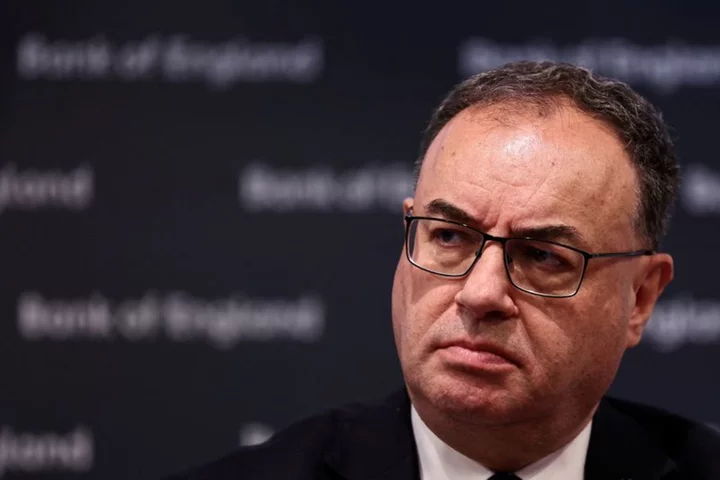
BoE's Bailey says getting inflation to 2% will be 'hard work'
LONDON Andrew Bailey, the governor of the Bank of England, said getting inflation down to the central bank's
1970-01-01 08:00
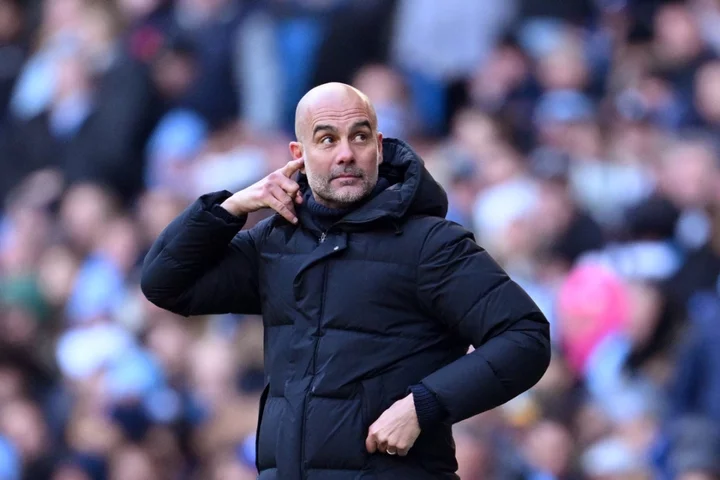
Pep Guardiola claims Man City only trained for ‘25 minutes’ before Liverpool clash
Pep Guardiola has claimed that he has not properly trained his Manchester City players in his seven years at the Etihad Stadium – despite winning five Premier League titles, the Champions League and a treble. And the Catalan said it is impossible to work with his players on the training pitch now without risking injuring them, because the fixture list is so packed. Guardiola said City are instead learning from their past after revealing they only did 20 or 25 minutes work on the pitches at the Etihad Campus to prepare for Saturday’s 1-1 draw with Liverpool, while they had a shorter pre-season than everyone else to give players time off after winning two finals in June. “In seven years I don’t train,” he said. “Maximum 35 minutes. We don’t train. They started pre-season 15 days before… do you know what 15 days is? We played the FA Cup final and the Champions League final. They had 15 days more with the new players. We didn’t do one day [of] tactical [work]. The day before, we train… it is the same for Jurgen [Klopp, the Liverpool manager], I’m pretty sure. We did 10-15 minutes with the ball and 10 minutes defensively.” City face RB Leipzig in the Champions League next and Guardiola is worried that if he tries to work with his players, he will lose others. Midfielders Kevin de Bruyne, Mateo Kovacic and Matheus Nunes are injured while the ill Jack Grealish also missed the Liverpool game, as he only named six outfield substitutes. “Before Tuesday it will be 10 minutes on the pitch, moving in that way,” Guardiola added. “We cannot train. If we train, we don’t have players for the next game. We don’t have them. That’s why we have to learn from the past: just understand what you have to do. The press, who jumps. This is what we absolutely rely on.” Guardiola joked that, instead of time on the training pitch, his players absorbed his message from his good looks. “Because I’m really good. I’m a handsome man, I seduce them,” he smiled. “No, today we have the TV images, we talk individually. I spoke with Ruben [Dias] and Kyle [Walker] about what happened at Chelsea [in the 4-4 draw]. They can make mistakes but just understand it. If they lose the ball, they lose the ball. But it’s about where and when you move, the spaces. Today [Saturday] was so good. I know what I’m talking about.” John Stones was an unused substitute on Saturday and Guardiola said the defender needs more time before he returns to the starting 11 or he may break down again. He explained: “He feels good but we want to give him one or two weeks to have proper strength training sessions. John is so important for us, I like him playing when he’s completely ready. He’s going to train, partially or complete, with us. His legs especially, to be sure that when he comes back he is stronger. And we then use him, we need him.” Read More Man City boss Pep Guardiola taking safety-first approach with John Stones Terry Venables inspired a generation to dream and left England wanting more Opposing managers happy with a point as Manchester City and Liverpool draw
1970-01-01 08:00

Schaeffler Increases Vitesco Offer Price to €94 Per Share
Schaeffler AG increased its offer for Vitesco Technologies Group AG to €94 per share, bringing the value of
1970-01-01 08:00

Pressure Grows on Israel to Prolong Cease-Fire in War With Hamas
Israel is coming under increasing pressure to agree to an extension of a four-day pause in its war
1970-01-01 08:00
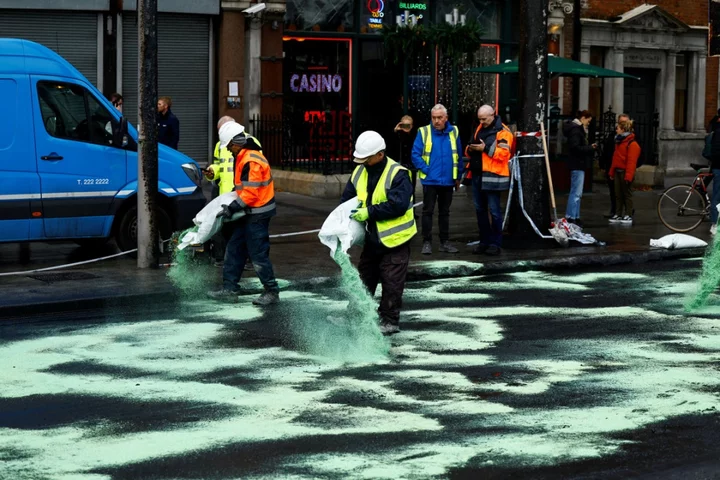
Booker Prize winner Paul Lynch on Dublin riots: This is always under the surface
Irish Booker prize winner Paul Lynch has said he was “astonished” by violent disturbances on the streets of Dublin this week, but this kind of behaviour is “always under the surface”. The author, who lives in Dublin, spoke at a Sunday press conference after he received the award during a ceremony at Old Billingsgate, London His dystopian novel Prophet Song explores what happens when his home country slides into authoritarianism. When asked what he thought about the riots in Ireland, which involved right-wing elements, Lynch said: “Like everybody else, I was astonished by it. “And at the same time, I recognise the truth that this kind of energy is always there under the surface and, I didn’t write this book to specifically say, ‘here’s a warning’, I wrote the book to articulate the message that the things that are in this book are occurring timelessly throughout the ages. “And maybe we need to deepen our own responses to that kind of idea. But at the same time, what was happening in Dublin? Well, you know, we can see it as a warning, I think we should see it was a warning.” Lynch also said he was “distinctly not a political novelist” and his book is really about “grief”, as it tells the story of a woman who has her husband taken away by the newly formed Irish secret police. He also said that “Ireland is an extraordinary country to live in” and a welcoming country. Lynch added: “It’s a great place for writers, any country that supports writers in the way that the Arts Council has supported me and many other really truly worthy Irish writers can only be a great place to live. “So I could not be more proud to be an Irish writer right now, it’s really something. “Well, you know, I think that if any of us were to look at the state of affairs from the point of view of 20 years ago, we couldn’t quite believe the modern world that we find ourselves in. “And I do think that you looked at things objectively, there is a sense of unravelling of a kind. “The question is, is what are we going to do about it and can anything be done about it? “I mean, Prophet Song is a counterfactual novel, it’s not a prophetic statement but there are resonances in it that are there for the taking for readers who want to think about these things.” He also said that “there’s layers and layers at work in my writing” and novels are complex. Lynch added: “To reduce the book down to one single message is actually pointless to a certain extent and goes against, the reason why I wrote the book, the book is actually its own answer.” He also said he was most likely to spend half of the prize, worth £50,000, on his mortgage. Lynch also said that before writing full time he had reached a point in his life where he had “exhausted all the possibilities”. He added: “There was a moment writing this book during lockdown, it was hugely challenging. I had long Covid for periods, and I’d wake up many days and I would have had just like, brain fog, and I had just, like, just fatigue, and I couldn’t work.” Read More Rishi Sunak slams Elon Musk’s ‘wrong’ remarks as antisemitism row deepens Former England footballer Ian Wright among those to collect honours What the papers say – November 27 Covid inquiry kicks off key week with Khan and Burnham giving evidence AI image generators ‘being used by children to create indecent images’ Bill to ban creation of new leasehold houses to be introduced to Parliament
1970-01-01 08:00
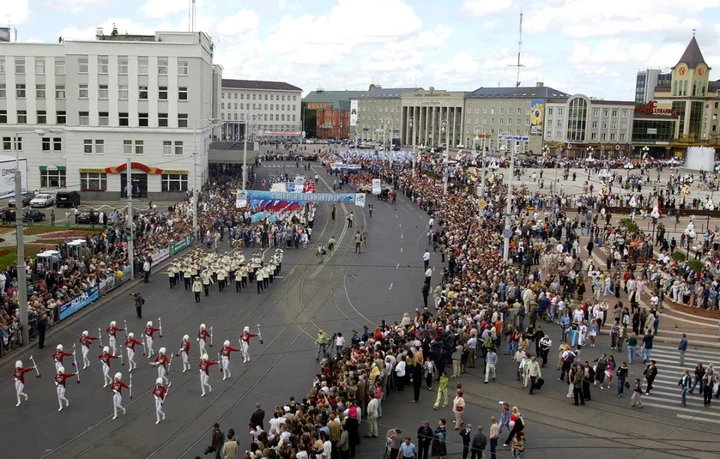
Russia forced to move air defences from Kaliningrad to Ukraine frontline amid heavy losses
Russia has likely been forced to move several air defence systems from its Kaliningrad enclave on the Baltic Sea coast to the frontline in Ukraine amid the losses it has suffered there, according to the UK Ministry of Defence (MoD). Vladimir Putin appears to have been left with no choice but to weaken the defences of Kaliningrad, an outpost bordered by Nato members on three sides and considered one of Moscow’s most strategically sensitive regions. “Exceptional Russian air transport movements through November 2023 suggest that Russia has likely moved strategic air defence systems from its Baltic coast enclave of Kaliningrad, to backfill recent losses on the Ukraine front,” the MoD said in its latest intelligence update on Sunday. Putin’s forces suffered particularly high losses to its SA-21 air defence systems in Russian-occupied Ukraine in late October 2023, it said. Ukrainian attacks most likely destroyed at least four Russian surface-to-air missile systems that were located in occupied territories in a span of a single week, the MoD said in an earlier update on 2 November. “The fact that the Russian MoD appears willing to accept additional risk here highlights the overstretch the war has caused for some of Russia’s key, modern capabilities,” the MoD said. Sandwiched between Poland and Lithuania on Nato’s eastern flank, Kaliningrad is geographically completely separated from the country’s main territory. The isolated oblast is only accessible to Russia through a contentious strip of land, the Suwalki gap, that links Russian ally Belarus to Kaliningrad. Moscow places significant strategic importance on Kaliningrad because it houses the Russian Baltic Fleet in the port of Baltiysk, and it stands out as one of Russia’s few ice-free European ports. In May, Poland said it was reverting the name of Kaliningrad to its historical name Krolewiec on maps, prompting a furious reaction from the Kremlin. The region was formerly called Koenigsberg when it was ceded from Germany to the Soviet Union after the Second World War. In 1946 the Soviets renamed it Kaliningrad, after Mikhail Kalinin, one of the leaders of the Bolshevik revolution. Read More Booker Prize winner Paul Lynch on Dublin riots: This is always under the surface Iceland’s new #1 selfie spot may have emerged out of ground despite volcano threat Russia places Meta spokesperson on wanted list Booker Prize winner Paul Lynch on Dublin riots: This is always under the surface Iceland’s new #1 selfie spot may have emerged out of ground despite volcano threat Russia places Meta spokesperson on wanted list
1970-01-01 08:00
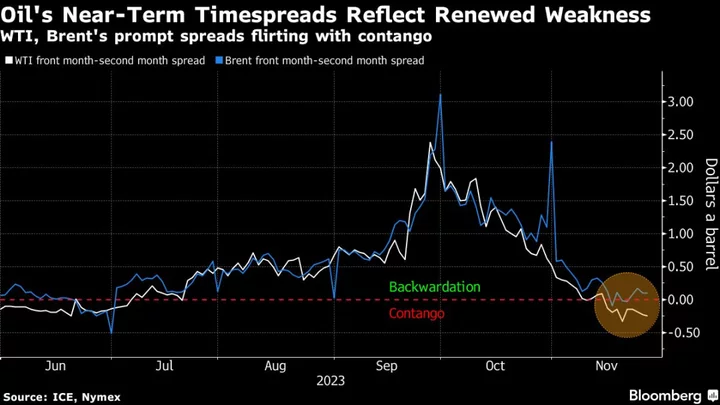
Oil Shows Signs of Softening Before High-Stakes OPEC+ Meet
Ahead of the delayed OPEC+ meeting on Thursday, there are indications oil supply is running ahead of demand,
1970-01-01 08:00
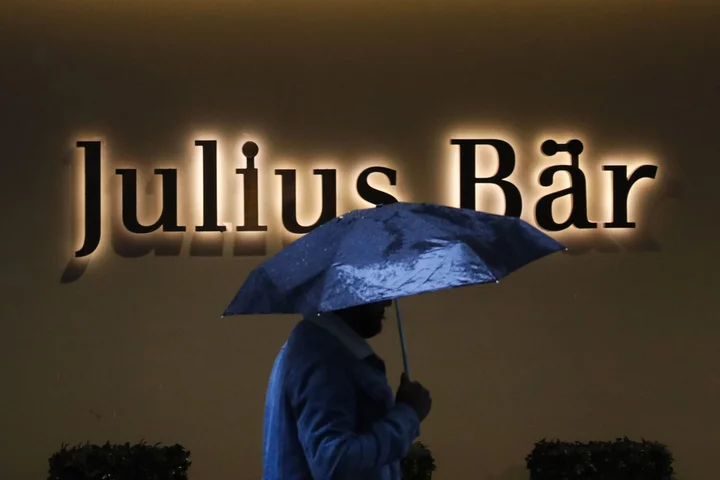
Julius Baer to Review Private Debt Business Over Signa Exposure
Julius Baer Group Ltd. is reviewing its private debt business after running up an exposure of 606 million
1970-01-01 08:00
